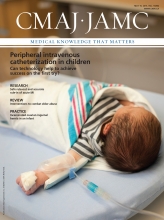Quebec’s Bill 20 is an “unprecedented attack on the professional autonomy of physicians,” associations representing 90 000 Canadian doctors told a committee of Quebec’s National Assembly on Mar. 25.
The Canadian Medical Association (CMA) and the Quebec Medical Association (QMA) jointly submitted a brief to the assembly’s Committee on Health and Social Services at the conclusion of the consultation process on Bill 20, which purports to increase access to family and specialist medical services. Dozens of other medical lobby groups, including Collège des médecins du Québec, Fédération des médecins omnipracticiens du Québec and Fédération des médecins spécialistes du Québec, also objected to the bill.
“Canadian physicians are concerned about the impact of Bill 20, which could affect the medical profession and especially patient care,” said Dr. Pierre Harvey, spokesperson for CMA, in his opening remarks.
At the core, Bill 20 is forcing family doctors to have a minimum of 1000 patients on their rosters, and to work at least 12 hours a week at a hospital, long-term care centre or other public facility. Health Minister Gaétan Barrette argues that this will ensure that every Quebecer has a family physician. He said that if doctors do not meet these goals, their salary could be cut by 30%.
“We believe this approach could have the adverse effect of leading physicians to choose quantity of care over quality,” said Dr. Laurent Marcoux, president of QMA. “It could lead to incomplete examinations, increased use of diagnostic tests and, ultimately, overdiagnosis.”
Statistics Canada reported in 2013 that 25% of Quebecers did not have a family physician compared with the national average of 15%.
“We think that this gap is not due to a lack of productivity from doctors in Quebec,” said Harvey. He pointed to a national survey reporting Canadian physicians decreasing working hours. “How is it that, despite this decrease in hours worked everywhere else in Canada, there is better accessibility to health care services? The answer is simple: innovation and full collaboration between the government and physicians.”

Bill 20 could affect patient care, said CMA spokesperson Dr. Pierre Harvey.
Image courtesy of Courtesy of CMA
For example, the CMA and QMA say that Quebec’s electronic health records efforts are lagging behind those of other provinces and that “is slowing down productivity of doctors.” The associations also recommend a different system of remuneration for doctors than the fee-for-service currently widely used. In addition, they proposed changing how work is organized so it is centred around greater contributions from other health care professionals.
But Barrette seemed unfazed by these recommendations and the fierce opposition he has heard over the bill over the past few weeks.
During consultations, Barrette said on several occasions that he was willing to amend the bill, but only if “it was demonstrated that other means could achieve the same results.”
“It was not the case,” concluded Barrette Mar. 25 at the end of the consultations. “We must propose changes that offer some guarantees, but these guarantees have not been provided,” he said. “No one answered the fundamental question: What is your solution that will ensure a real contractual agreement with doctors?”
He came to this conclusion despite the efforts of the president of the Fédération des médecins omnipracticiens du Quebec, Dr. Louis Godin, who adopted a more conciliatory tone when he appeared before the committee on Mar. 19. Previously, the federation wanted the bill revoked, and although he is reported as saying that the bill remains “catastrophic,” he adds that family physicians are committed to adapting their practice so more Quebecers have access to a doctor. Godin proposed phasing family doctors out of hospital work and forming super clinics to take pressure off emergency departments.
Procreation
Bill 20 also proposes to amend “various legislative provisions relating to assisted procreation” including covering only one round of IVF treatment and artificial insemination for women between the ages of 18 and 42. The province claims this will save nearly $50 million annually.
Following the committee hearings, the only amendment Barrette is considering is the question of the age of the woman seeking to have a child. The bill expressly prohibits in vitro fertilization for women over 42, even for those willing to pay. Barrette says he could soften his stance on this issue and allow, for instance, the treating physician to decide whether a patient is able to undergo the procedure, given her age, health and fitness.
Before making a final decision, Barrette is waiting for new guidelines from the Collège des médecins du Québec.
Access to abortion under Bill 20 was also questioned Mar. 25, by the Centre de santé des femmes de Montréal. That story made headlines across Canada, but both Barrette and Premier Philippe Couillard said Bill 20 would not affect abortion services in Quebec.
There are now strong indications that the government will force the adoption of Bill 20, as it did with Bill 10, which reorganized the health network, on Feb. 5 2015.











